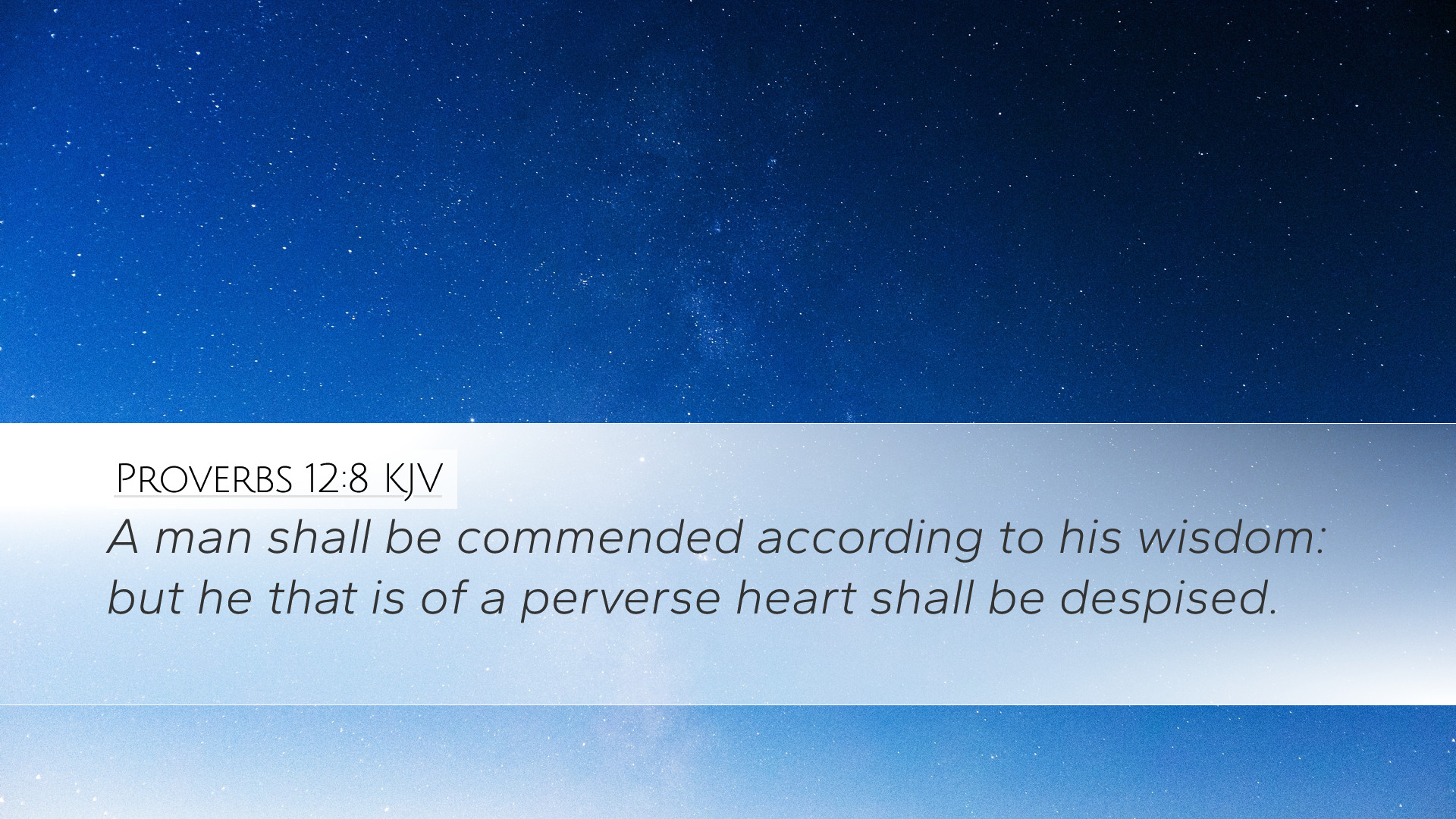Commentary on Proverbs 12:8
Verse: "A man shall be commended according to his wisdom: but he that is of a perverse heart shall be despised." (Proverbs 12:8)
Overview
This verse encapsulates the contrasting outcomes resulting from wisdom and folly. The Proverbs are rich with practical insights into human behavior and character, offering salient lessons on the nature of commendation and scorn based on one's inner qualities.
Insights from Public Domain Commentaries
Matthew Henry's Commentary
Matthew Henry emphasizes the virtue of wisdom in this passage, noting that commendation is a natural response to those who display wisdom in their actions and decisions. He observes that wisdom is a sought-after quality, not only because it leads to moral and ethical behavior but also because it reflects the fear of God, which is the beginning of wisdom (Proverbs 1:7).
-
Commendation of Wisdom: Henry notes that those who act wisely earn respect and receive commendation from others. Wisdom exemplifies discernment, prudence, and insight, which are qualities that society values.
-
Perversity of Heart: In stark contrast, a perverse heart reflects ill intentions and moral corruption. This leads to the individual being despised, illustrating the societal rejection of those who are deceitful or lack integrity.
-
Application: Henry encourages readers and leaders alike to cultivate wisdom and to be aware that their internal state will eventually manifest outwardly, influencing how they are regarded by others.
Albert Barnes' Notes on the Bible
Albert Barnes elaborates on the importance of wisdom in shaping a person's reputation. He draws attention to the idea that wisdom is not simply intellectual knowledge but involves moral judiciousness and the longing for what is right.
-
The Nature of Commendation: Barnes points out that commendation arises from a recognition of one’s character traits, which are reflected through wise actions. Such commendation serves not only as praise but also as an affirmation of moral standing within the community.
-
Warning Against Perverse Hearts: The warning is clear—those who possess a corrupt moral compass will find themselves isolated and despised. Barnes explains this bitterness that accompanies perversion and how it leads to rapid moral decline.
-
Cultural Implications: He underscores the cultural implications of this proverb, urging societies to foster environments where wisdom is celebrated and corrupt practices are actively discouraged.
Adam Clarke's Commentary
Adam Clarke brings to light the psychological and social dimensions of the verse. He elucidates the correlation between wisdom and the esteem of others, arguing that wisdom begets trust and reliability in relationships and communities.
-
Consequences of Wisdom: Clarke emphasizes that wisdom often results in positive outcomes: a commendable character leads to influence and leadership whereas foolishness and perversity lead to a fall from grace.
-
Perverse Heart and Reputation: Perversity, Clarke posits, inevitably damages one’s reputation. Individuals with perverse intentions may initially deceive others, but the truth about their character will ultimately surface, resulting in disdain from those around them.
-
Pastoral Reflection: Clarke encourages pastors and leaders to be vigilant in self-examination of their hearts and actions, recognizing that a true reflection of wisdom not only influences personal legacy but also the spiritual health of the community they serve.
Theological and Practical Implications
This verse is particularly relevant for a theological discourse on the nature of human character and morality. It reveals fundamental truths applicable not only to personal spiritual growth but also to community life and leadership.
-
Affirmation of Wisdom's Value: The communal affirmation of wisdom reflects God's created order; establishing and promoting standards of righteousness and ethical living is essential for the flourishing of any society.
-
Call to Self-Examination: It urges a deep introspection regarding one's own motives and desires, challenging readers to align their hearts with wisdom and integrity.
-
Community Responsibility: There is also a community responsibility to uphold standards of wisdom and to effectively recognize and call out unrighteousness, thus nurturing an environment conducive to spiritual growth.
Conclusion
This verse serves as a profound reminder of the interplay between wisdom and reputation. It calls upon individuals not only to seek wisdom but to embody it, showcasing the importance of an upright heart in the pursuit of a commendable life. As believers engage with this wisdom in their daily lives, they contribute to the fabric of a society guided by righteousness and integrity.


